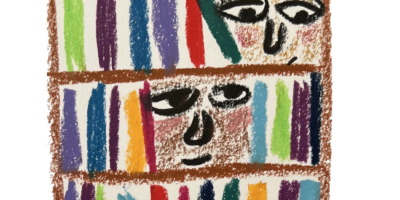
A Novel of Operation Moses
Straddling Black and White by Kim Salzman (Acorn Publishing, $15.99) is a novel about a young woman’s arduous and courageous Aliyah journey as part of Operation Moses, the massive air- lift of Ethiopian Jewry to Israel in the 1980s. When she is just 14, Azmera sets off with her father’s brother Solomon from her Ethiopian village to a refugee camp in Sudan, leaving behind her pregnant mother, Tigest, and her four younger siblings. Meanwhile, Azmera’s father, Kebede, already arrived in Israel, struggles to learn a new language and integrate into a new culture. Narrated from the shifting perspectives of Azmera, her father, her uncle, and her mother, this novel explores the complex intersections of poverty, racism, immigration, absorption, and Jewish identity.
When the novel opens, Azmera is accustomed to a life of kneading injera bread, beating her clothes clean against the rocks by the creek, and helping her mother care for her younger siblings in their gojo hut made of tree branches, reeds, and mud. Though the novel flashes back to describe Tigest’s forced marriage as a young teenager, the majority of the book follows Azmera as she endures excruciatingly long days of walking despite cramps and blisters toward the refugee camp in Sudan where she and Solomon hope to make it in time to board a plane to Israel. Solomon, unlike Azmera, has been prepared for this journey; as he tells Azmera, he and her father would meet every evening in their local village synagogue to memorize the way to Sudan, learning alternate routes in case they had to change plans. “If anyone ever saw us,” Solomon tells Azmera, “we just told them we were at maariv, doing our evening prayers.”
This readable and well-paced novel captures the nuances of Azmera’s family’s experiences—the pain of her aunt Meskie’s childlessness in Ethiopia (“a women left empty-handed after six years of marriage had to be mourning the loss of something—of one baby, two babies, or more”), the challenges of staying in touch with family members when letters are confiscated by the Sudanese government, the estrangement between a husband and wife who don’t share their inner emotional lives. We learn about various aspects of Operation Moses in 1984, which covertly brought 8,000 Beta Israel Jews, primarily from the Gondar region of the Ethiopian highlands, in thirty flights from Sudan, and Operation Solomon in 1991, which brought another 14,000 Jews and reunited many families, like Azmera and her mother.
The novel, dedicated to the more than 4,000 Ethiopian Jews who died on their way to Israel, conveys the hardships of the journey through the experiences of Solomon and Azmera. Together they must confront stampeding antelopes, charging buffalo, an insufficient water supply, and “Falasha-finders” who must vouch for their Jewishness before they can take part in the airlift. Meanwhile, we learn firsthand about Azmera’s father’s difficult acculturation in the Dimona absorption center, where he sits through lectures about deodorant, toilet paper, and the role played by the clock in Israeli culture—he is used to a life governed by the sun and moon, not to office hours and school bells. But worse than the bureaucracy and condescension he encounters in the absorption center is the discovery that his marriage to Tigest would be considered illegal in the State of Israel, since he forced himself on her when she was just thirteen. By the time Kebede is reunited with Azmera and Solomon, he has all but lost faith in himself—he is “not the proud Israeli he had hoped to be but just another drunk Ethiopian immigrant who could barely speak the local language.”
Here, as often throughout the book, the characters threaten to devolve into stereotypes: the drunk Ethiopian, the unsuspecting provincial girl, the feared but admired Ulpan teacher, the racist woman on the public bus who holds her nose when Azmera passes. Furthermore, the lesson Azmera ultimately learns in the book’s final pages smacks of cliché; she must realize that the world she once took for granted as black and white is more nuanced and complex. The author has written what may very well be the first novel in English about the Ethiopian Aliyah. If Salzman’s characters seem like composites, it is presumably because they are meant to represent so many whose experiences have not previously been given voice.
Salzman, who worked for the United Nations Refugee Agency and for an organization advocating for the legal rights of Ethiopian immigrants to Israel, is herself an immigrant to the State of Israel, hailing originally from Columbus, Ohio. She confesses in an online author interview that “as I wrote, I struggled with whether I had the right to tell this story, given that it wasn’t my own.” Ultimately, she concludes that the Ethiopian Aliyah is such an important chapter in Jewish and Israeli history, that she’s succeeded “if my writing can give their story the true justice it deserves.”
Prior to reading Salzman’s book, I translated a Hebrew novel by Ethiopian- Israeli author Dalia Betolin-Sherman about the author’s Aliyah experience; the manuscript is still in search of an American publisher. While Straddling Black and White may be the first of its kind to be published in English, it will hopefully not be the last.
Ilana Kurshan is the author of If All the Seas Were Ink, winner of the Sami Rohr Prize for Jewish literature.






